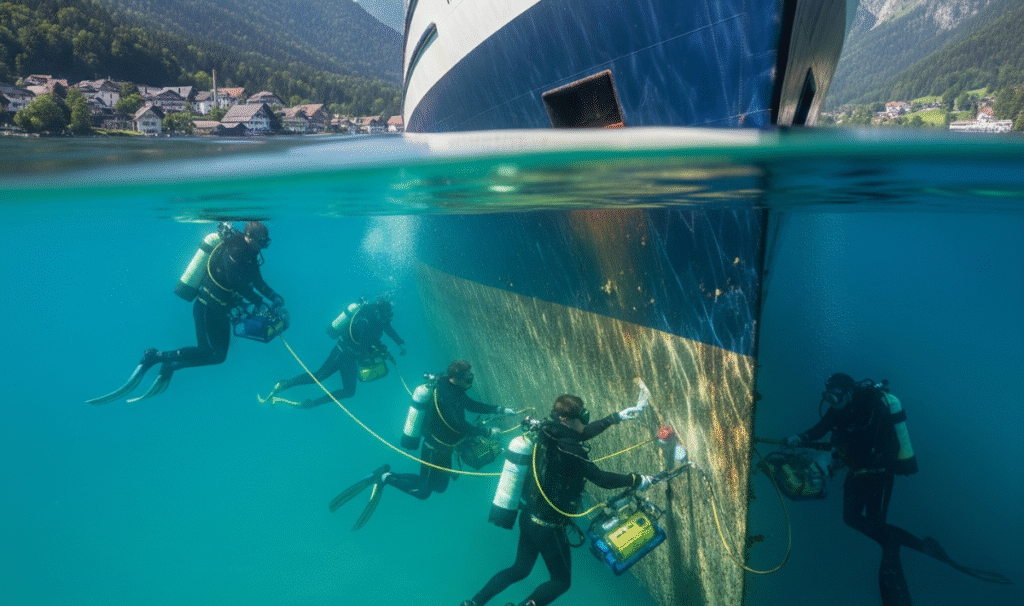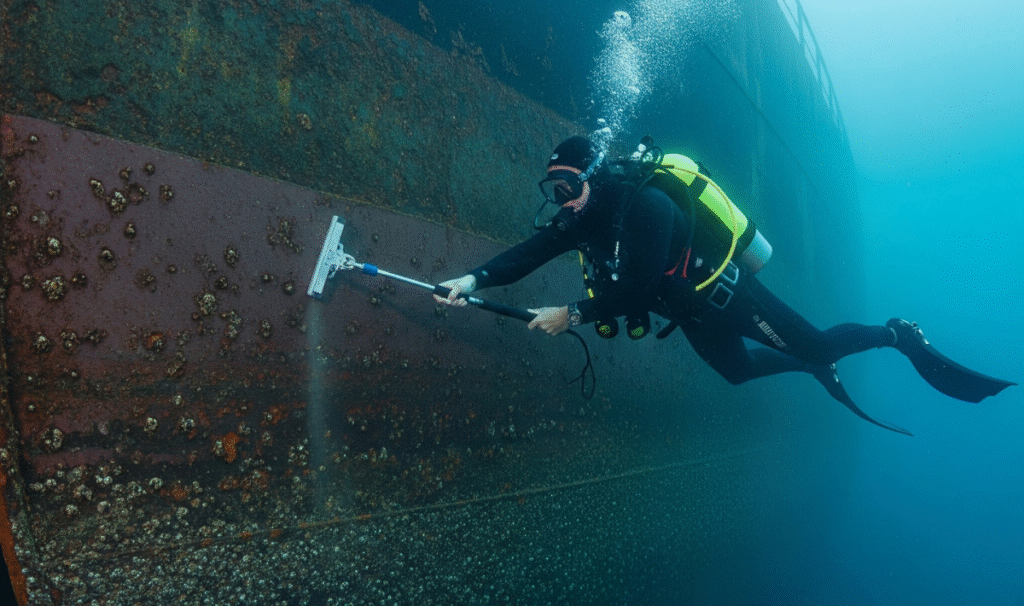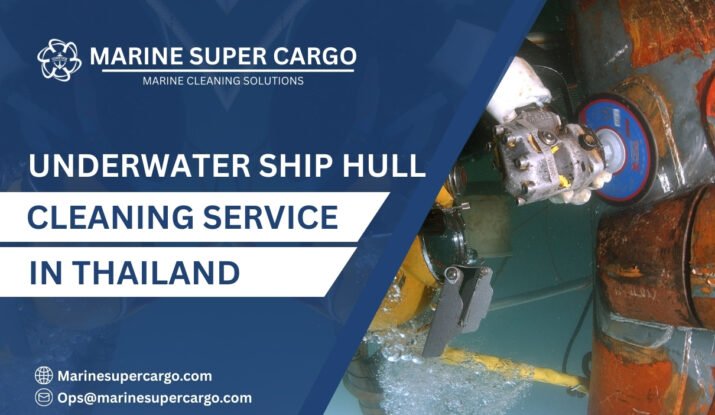Picture this: you’re trying to cycle with mud caked on your wheels. Each push of the pedal feels heavier, slower, more exhausting. That’s exactly how a ship feels when marine growth covers its hull. Ships traveling in tropical waters like those around Thailand are especially prone to barnacles, algae, and biofouling. This is why underwater ship hull cleaning in Thailand is more than just routine maintenance—it’s a secret weapon that helps ships save fuel, protect the sea, and reduce costs.
The Basics of Hull Maintenance
Hull cleaning is the underwater process of removing algae, barnacles, and other marine life that accumulate below the waterline. Trained divers or robotic cleaners scrub the hull, restoring its smooth surface and ensuring efficient sailing without costly dry docking.
Why Thailand’s Waters Need Special Attention
Thailand is blessed with warm, nutrient-rich waters in the Gulf of Thailand and the Andaman Sea. While beautiful for diving and marine tourism, these same waters accelerate biofouling. Ships that pass through quickly develop heavy growth, making underwater ship hull cleaning in Thailand an essential service for smooth operations.

The Hidden Cost of Biofouling
Biofouling isn’t just unsightly—it’s expensive. Even a thin layer of barnacles and algae can increase drag, forcing ships to burn more fuel. According to imo.org, fouled hulls can increase fuel consumption by up to 40%. That’s like your car suddenly drinking twice as much fuel for the same distance.
Smoother Hulls, Smoother Sailing
Regular underwater ship hull cleaning in Thailand ensures that vessels glide like dolphins through water instead of struggling like swimmers with ankle weights. The result? Lower fuel bills, faster transit times, and less engine strain. Efficiency becomes not just a benefit—it’s a competitive edge.
Tackling the Spread of Invasive Species
Ships often carry tiny, unwanted hitchhikers—microscopic organisms stuck to hulls that travel across oceans. When released into new waters, these invaders disrupt ecosystems and threaten local marine life. The International Association of Ports and Harbors stresses that preventing biofouling is critical to environmental protection. Underwater ship hull cleaning in Thailand helps stop this biological smuggling.
Staying Compliant with MARPOL and IMO Guidelines
The MARPOL Convention sets strict rules for pollution prevention, and the IMO strongly encourages responsible biofouling management. Regular underwater ship hull cleaning in Thailand not only cuts emissions but also helps fleets stay compliant with international maritime law. Sustainability, in this case, is both a duty and a strategic advantage.
Preventing Corrosion and Long-Term Hull Damage
Marine growth doesn’t just slow ships—it creates micro-environments that trap saltwater and accelerate rust. Left unchecked, this weakens the ship’s protective coatings and eventually compromises structural integrity. Timely underwater ship hull cleaning in Thailand can save vessels from long-term damage.
Saving Money on Repairs and Docking
By addressing fouling regularly, shipowners avoid emergency repairs, minimize dry dock requirements, and reduce downtime. It’s the difference between paying for a check-up and paying for major surgery—regular hull cleaning saves money and protects vessels.
Tools and Cleaning Techniques Used in Thailand
From high-tech hydraulic brushes to robotic crawlers, cleaning has evolved far beyond scrubbing with handheld tools. Some methods, as highlighted by cleanship.co, even suction up debris to prevent polluting the ocean. Divers in Thailand combine technology with hands-on skills to deliver efficient and eco-friendly results.
Safety Standards and Best Global Practices
Diving is no easy feat. The International Marine Contractors Association enforces rigorous safety and quality standards worldwide. With these best practices, underwater ship hull cleaning in Thailand remains safe for divers, ships, and ecosystems.
Busy Maritime Routes and Geographic Advantages
Thailand is strategically located between some of the busiest shipping corridors in Asia. With its ports connecting to the South China Sea and the Indian Ocean, ships frequently stop for cargo, making underwater ship hull cleaning in Thailand both accessible and efficient.
Strong Local Expertise in Marine Services
Thailand’s maritime industry has grown alongside its booming trade and tourism economy. Skilled local divers, engineers, and marine technicians bring both knowledge and innovation to the process, making the country a trusted destination for hull cleaning services.
Myth: It Harms Marine Life
Contrary to belief, modern cleaning methods are designed to minimize environmental disruption. In fact, by removing invasive organisms early, underwater ship hull cleaning in Thailand helps maintain balance in marine ecosystems.
Myth: It Damages Protective Coatings
Advanced tools and soft brushes are designed specifically to avoid damaging anti-fouling paints. This means protective coatings last longer when cleaning is done properly, saving vessels money in the long run.

How Often Should Cleaning Be Scheduled?
Ships navigating the Gulf of Thailand should plan hull cleaning every 3–5 months due to fast biofouling growth in warm tropical waters. This schedule ensures consistent efficiency.
Choosing a Certified and Eco-Friendly Provider
Shipowners should prioritize companies that follow IMO standards, use eco-conscious methods, and employ experienced divers. When done right, underwater ship hull cleaning in Thailand is safe, efficient, and sustainable.
Conclusion
At its core, hull cleaning is about balance. You save fuel and money, protect the environment, and extend your vessel’s life—all with one smart decision. The three major benefits of underwater ship hull cleaning in Thailand make it clear: cleaner hulls mean smoother voyages, greener operations, and healthier profits. In the end, every ship deserves a clean slate beneath the waves.
FAQ:
Q1. How often should I schedule underwater ship hull cleaning in Thailand?
Every 3–5 months, depending on vessel type, routes, and fouling levels in tropical waters.
Q2. Does underwater ship hull cleaning in Thailand reduce fuel costs significantly?
Yes. Clean hulls can save up to 30–40% in fuel, cutting expenses and emissions.
Q3. Is the process safe for divers and marine ecosystems?
Absolutely. Certified divers use eco-friendly and safe techniques in line with IMCA and IMO guidelines.
Q4. Why is Thailand an important hub for hull cleaning in Asia?
Its ports sit on some of the busiest shipping lanes, making hull cleaning services convenient and globally relevant.
Q5. Can hull cleaning extend the lifespan of my ship?
Yes. Regular underwater cleaning prevents corrosion, protects coatings, and delays costly repairs, ensuring vessels stay ocean-ready for longer.


